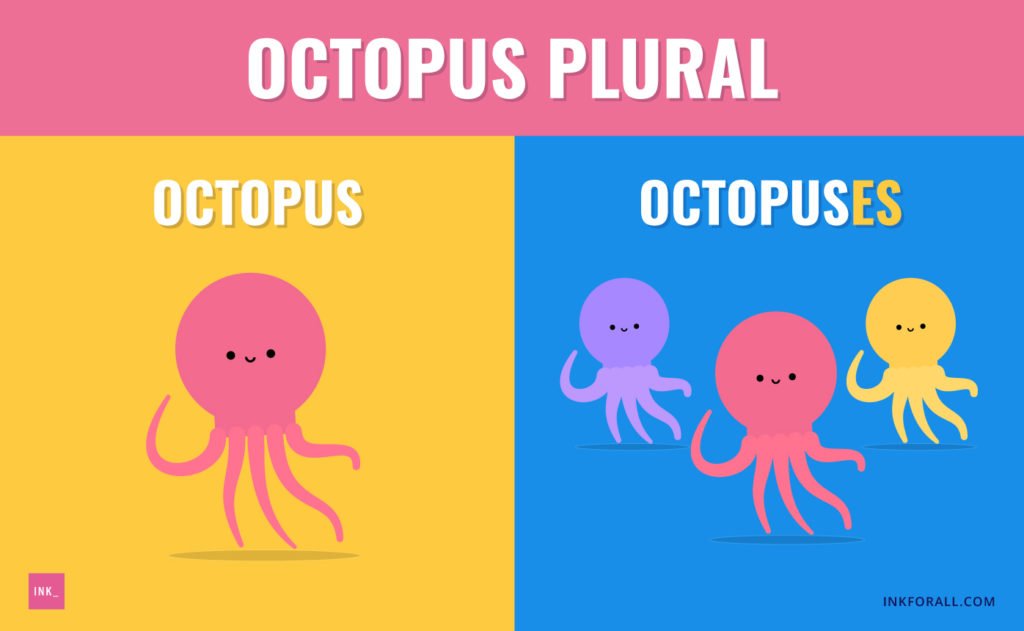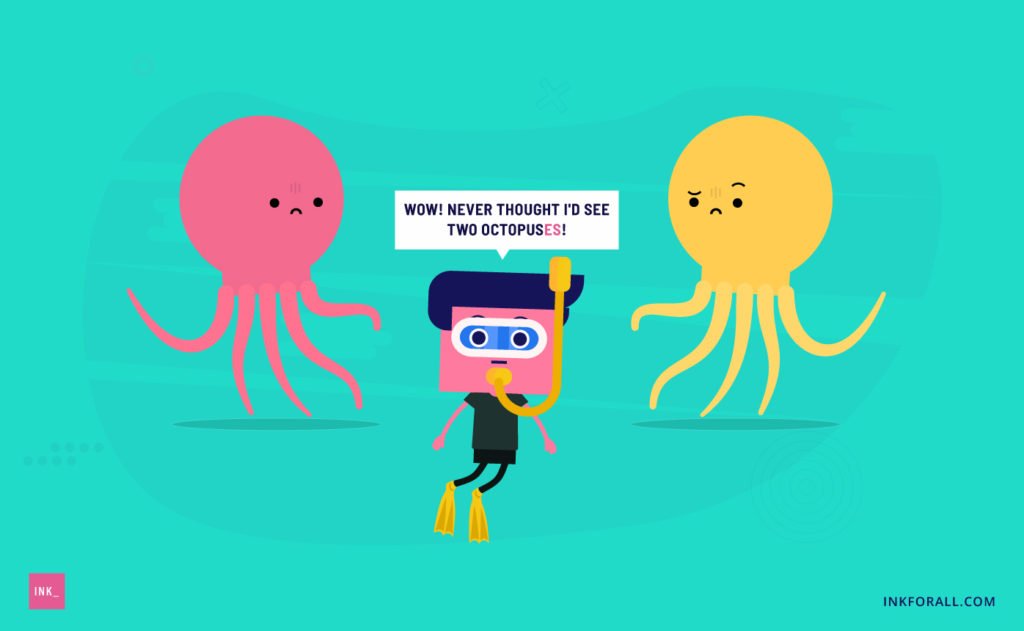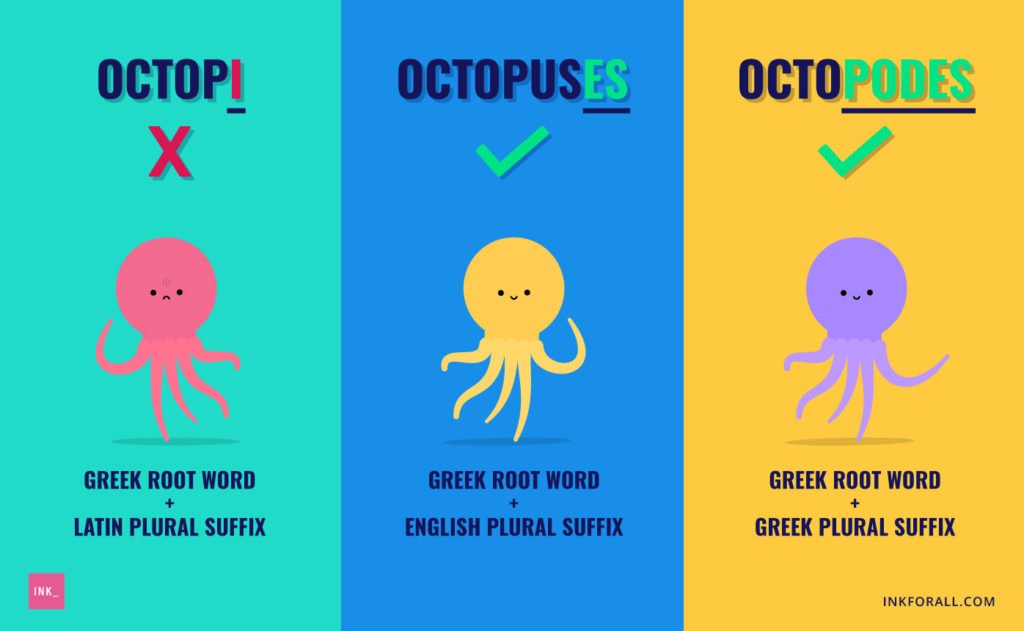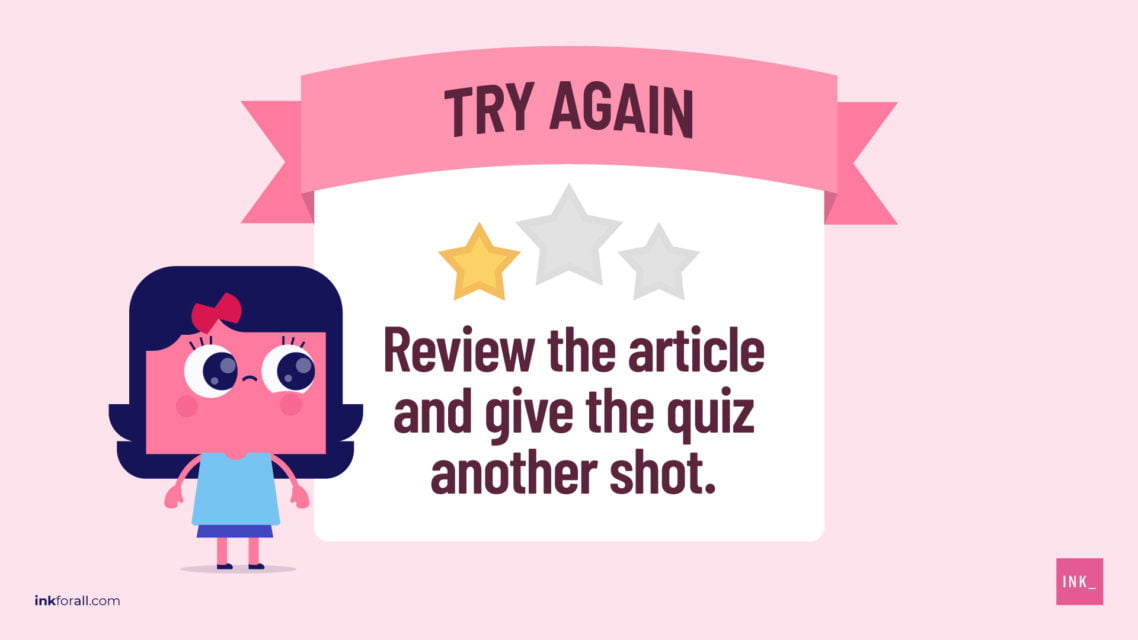What Is the Plural Word for Octopus
Is it octopi or octopuses? That confusion ends now. We'll dig into why octopuses is the correct plural of octopus. Does it sound weird? Sure. Are you slightly afraid to say it in polite company? Probably. But that doesn't make it any less correct. We'll also explain why the two irregular plurals for my favorite cephalopod even exist.
🤩 Flawless spelling & grammar are just the beginning. Eliminate errors, get topic ideas, increase productivity, and outrank your competition with the #1 smartest content editor — INK. 🤩

Get the Best Writing Tool For Free
First AI web content optimization platform just for writers
GET INK
Main Octopus Plural Takeaways:
- The correct plural of octopus is octopuses.
- Irregular octopus plurals include octopi and octopodes. These may be acceptable in some dictionaries, but octopuses is always correct.
- Octopi follows Latin rules for making words plural but octopodes follows Greek pluralization rules.
- This is because octopus is actually a Latinized Greek word, which accounts for a lot of the octopus plural confusion.

What is the Correct Plural of Octopus?
The correct plural of octopus is octopuses. Although this word has ancient Latin and Greek roots, it's an English word that follows normal English pluralization rules for words ending in "s." There are technically three octopus plurals: octopi, octopodes, and octopuses. The first two come from Latin and Greek respectively, both of which are tied to the origins of the word octopus. The last option, octopuses, is the preferred pluralization in English.
So, can you say octopuses or is that even a word? Yes, and yes. That's because it follows grammar rules suggesting that nouns ending in -s switch to an -es ending when pluralized.
Other similar plurals include:
- Gas becomes gases
- Bus becomes buses
- Lens becomes lenses
- Grass becomes grasses
- Loss becomes losses
(As with practically all things in English grammar, there are some exceptions to this rule.)
Why is it Octopuses and not Octopi?
Grammatically speaking, the correct plural form of the word octopus is octopuses. According to the Merriam-Webster dictionary, the term octopi was formed based on the belief that Latin singular words ending in 'us' must end in the letter 'i' (e.g. fungus-fungi, stimulus-stimuli, cactus-cacti).
Technically speaking, octopus is of Greek origin, not Latin. But, it was in the New Latin language before being introduced to English. So, following octopus's origin, some people would argue that its correct plural form should be octopodes (Greek) and not octopi .
But, if you are to choose between octopi or octopuses, always choose octopuses. Notwithstanding octopus's ancient roots, it is technically a modern English word. Meaning, it must follow English pluralization rules.
Is Octopus Latin or Greek?
The word octopus is both Latin and Greek. In fact, it's technically a Latinized form of a Greek word to describe a creature with eight legs (ὀκτώ or okto, meaning eight + πούς or pous, meaning foot). The word was then Latinized to form octopus.
❓ Why 3 Octopus Plurals Exist:
- Some experts felt the plural of octopus should match the word's origins.
- The problem is that octopus has both Greek and Latin roots. How do you choose which convention to follow?
- Since the modern word is English, we follow English pluralization rules. Therefore, octopuses is the most correct option.

What is the Irregular Plural for Octopus?
The correct plural of octopus is octopuses, but irregular plural forms for octopus are octopi and octopodes. These irregular octopus plurals come from the word's Latin and Greek roots. For example, our modern English word octopus comes from ancient Greek roots that describe a creature with eight legs (ὀκτώ or okto, meaning eight + πούς or pous, meaning foot). The word was then Latinized to form octopus. As such, octopodes follows Greek pluralization rules. Conversely, octopi follows Latin pluralization rules.
These odes to the word's ancient roots in the form of irregular octopus plurals are understandable. And, even interesting.
However, at the end of the day, octopus is now an English word. As such, it follows English grammar rules.
🐙 Greek Origins of the Word Octopus:
- ὀκτώ = okto = eight
- πούς = pous = foot
- ὀκτώπούς (oktopous) ➡️ octopus
While octopuses would be the assumed plural, some people use octopi or octopodes. Both of those are correct but highly irregular. These outliers can cause writers of all ages to have absolute fits. Just when you think you've got the hang of the English language, it throws a curveball. Some examples of irregular plurals are aircraft/aircraft (instead of aircrafts) and antenna/antennae (instead of antennas). And yes, octopus is included in that group too!
📝 An irregular plural is a plural that doesn't conform to the grammatical standard.
What is the Name for a Group of Octopuses?
The most widely accepted name for a group of octopuses is a consortium. Other terms include tangle or clutch, but clutch is actually only proper when referring to a group of octopus eggs. It's important to note that octopuses are usually solitary creatures that prefer to live alone. For this reason, there really isn't an established name for a group of octopuses on the same level as a herd of cattle or murder or crows.
📝 The word octopus first appeared in 1758 in reference to the many-armed mollusks you find in the sea.
When did Octopi Become Octopuses?
Because 'octopi' is a plural based on Latin grammar rules, you'd be forgiven for thinking it predates the plural octopuses. You would not, however, be correct. In reality, the English language adopted the word octopus in the mid-1700s. Because English nouns ending in -s are switched to -es when made plural, octopus became octopuses. It wasn't until the 1900s that grammarians looked at the Latinized Greek origins of octopus and decided the plural of octopus should be octopi instead.

Octopus Plural Timeline:
- 1750s: The word octopus enters the English language. As such, the plural of octopus follows English grammar rules (octopus; octopuses ).
- 1900s: Victorian-era grammarians argue that since the word octopus comes from Latinized Greek, it should follow Latin grammar rules for plurals. As a result, the irregular plural octopi starts to appear in some dictionaries.
Let's see how Well you Know Octopus Plural in the Quiz Below
Octopus Plural Question #1
Correct! Oops! That's incorrect.
The answer is D. All of these are acceptable ways to spell the plural for octopus.
Octopi or Octopuses Question #2
Correct! Oops! That's incorrect.
The answer is C. Grammar rules suggest that nouns ending in "-s" switch to an "-es" ending when pluralized.
Plural of Octopus Question #3
Correct! Oops! That's incorrect.
The answer is TRUE. That's why some grammar experts argue that the plural form should follow Latin grammar rules (octopi).
Octopus Plural Question #4
Correct! Oops! That's incorrect.
The answer is D. "Clutch" is only acceptable when referring to a group of octopus eggs.
Octopus Plural Question #5
Correct! Oops! That's incorrect.
The answer is FALSE. The word "octopus" first appeared in 1758 to describe many-armed mollusks you find in the sea.
Octopus Plural Quiz Result
Expert!

Not bad!

Almost got it! Review the article and try again.

Read More: Possum vs. Opossum: Definitely Different Animals
What Is the Plural Word for Octopus
Source: https://blog.inkforall.com/octopus-plural